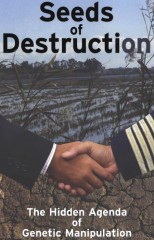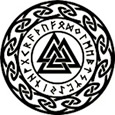
Author : Engdahl William
Title : Seeds of destruction The hidden agenda of genetic manipulation
Year : 2007
Link download : Engdahl_William_-_Seeds_of_destruction.zip
This book is about a project undertaken by a'small socio-political elite, centered, after the Second World War, not in London, but in Washington. It is the untold story of how this self-anointed elite set out, in Kennan's words, to "maintain this position of disparity" It is the story of how a tiny few dominated the resources and levers of power in the postwar world. It's above all a history of the evolution of power in the control of a select few, in which even science was put in the service of that minority. As Kennan recommended in his 1948 internal memorandum, they pursued their policy relentlessly, and without the "luxury of altruism and world-benefaction." Yet, unlike their predecessors within leading circles of the British Empire, this emerging American elite, who proclaimed proudly at war's end the dawn of their American Century, were masterful in their use of the rhetoric of altruism and world-benefaction to advance their goals. Their American Century paraded as a softer empire, a "kinder, gentler" one in which, under the banner of colonialliberation, freedom, democracy and economic development, those elite circles built a network of power the likes of which the world had not seen since the time of Alexander the 'Great some three centuries before Christ-a global empire unified under the military control of a sole superpower, able to decide on a whim, the fate of entire nations. This book is the sequel to a first volume, A Century of War : AngloAmerican Oil Politics and the New World Order. It traces a second thin red line of power. This one is about the control over the very basis of human survival, our daily provision of bread. The man who served the interests of the postwar American-based elite during the 1970's, and came to symbolize its raw realpolitik, was Secretary of State Henry Kissinger. Sometime in the mid-1970's, Kissinger, a life-long practitioner of "Balance of Power" geopolitics and a man with more than a fair share of conspiracies under his belt, allegedly declared his blueprint for world domination: "Control the oil and you control nations. Control the food, and you control the people." The strategic goal to control global food security had its roots decades earlier, well before the outbreak of war in the late 1930's. It was funded, often with little notice, by select private foundations, which had been created to preserve the wealth and power of a handful of American families. Originally the families centered their wealth and power in New York and along the East Coast of the United States, from Boston to New York to Philadelphia and Washington D.C. For that reason, popular media accounts often referred to them, sometimes with derision but more often with praise, as the East Coast Establishment. The center of gravity of American power shifted in the decades following the War. The East Coast Establishment was overshadowed by new centers of power which evolved from Seattle to Southern California on the Pacific Coast, as well as in Houston, LasVegas, Atlanta and Miami, just as the tentacles of American power spread to Asia and Japan, and south, to the nations of Latin America. In the several decades before and immediately following World War II, one family came to symbolize the hubris and arrogance of thi,s emerging American Century more than any other. And the vast fortune of that family had been built on the blood of many wars, and on their control of a new "black gold" oil. What was unusual about this family was that early on in the building of their fortune, the patriarchs and advisors they culti. vated to safeguard their wealth decided to expand their influence over many very different fields. They sought control not merely over oil, the emerging new energy source for world economic advance. They also expanded their influence over the education of youth, medicine and psychology, foreign policy of the United States, and, significant for our story, over the very science of life itself, biology, and its applications in the world of plants and agriculture. For the most part, their work passed unnoticed by the larger population, especially in the United States. Few Americans were aware how their lives were being subtly, and sometimes not so subtly, influenced by one or another project financed by the immense wealth of this family. In the course of researching for this book, a work nominally on the subject of genetically modified organisms or GMO, it soon became clear that the history of GMO was inseparable from the political history of this one very powerful family, the Rockefeller family, and the four brothers-David, Nelson, Laurance and John D. III-who, in the three decades following American victory in World War II, the dawn of the much-heralded American Century, shaped the evolution of power George Kennan referred to in 1948. In actual fact, the story of GMO is that of the evolution of power in the hands of an elite, determined at all costs to bring the entire world under their sway. Three decades ago, that powerwas based around the Rockefeller family. Today, three of the four brothers are long-since deceased, several under peculiar circumstances. However, as was their will, their project of global domination-"full spectrum dominance" as the Pentagon later called it-had spread, often through a rhetoric of "democracy:' and was aided from time to time by the raw military power of that empire when deemed necessary. Their project evolved to the point where one small power group, nominally headquartered in Washington in the early years of the new century, stood determined to control future and present life on this planet to a degree never before dreamed of. The story of the genetic engineering and patenting of plants and other living organisms cannot be understood without looking at the history of the global spread of American power in the decades following World War II. George Kennan, Henry Luce, Averell Harriman and, above all, the four Rockefeller brothers, created the very concept of multinational "agribusiness': They financed the "Green Revolution" in the agriculture sector of developing countries in order, among other things, to create new markets for petto-chemical fertilizers and petroleum products, as well as to expand dependency on energy products. Their actions are an inseparable part of the story of genetically modified crops today. ...

Klieman Aaron - Israel's global reach
Author : Klieman Aaron S. Title : Israel's global reach Arms sales as diplomacy Year : 1985 Link...














